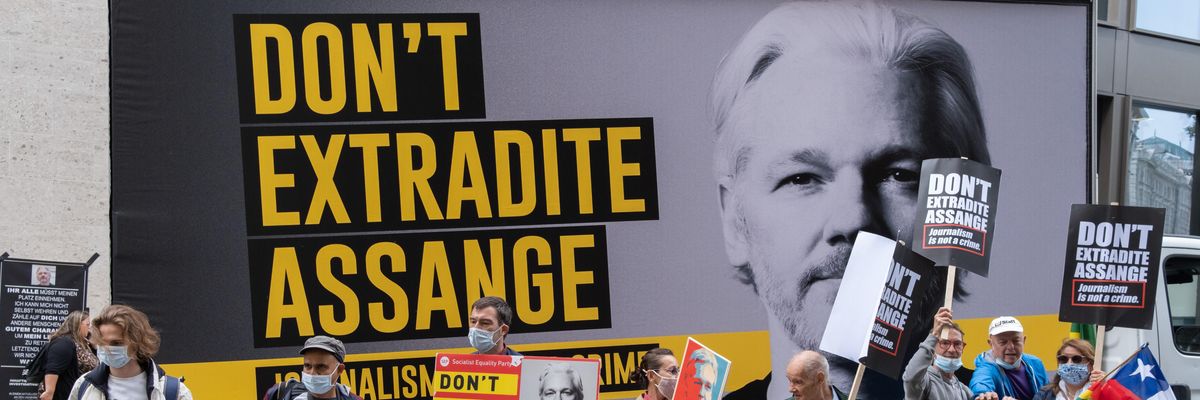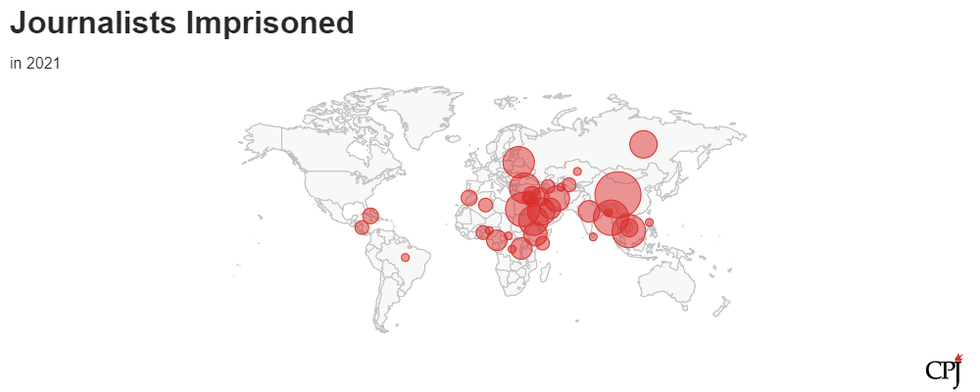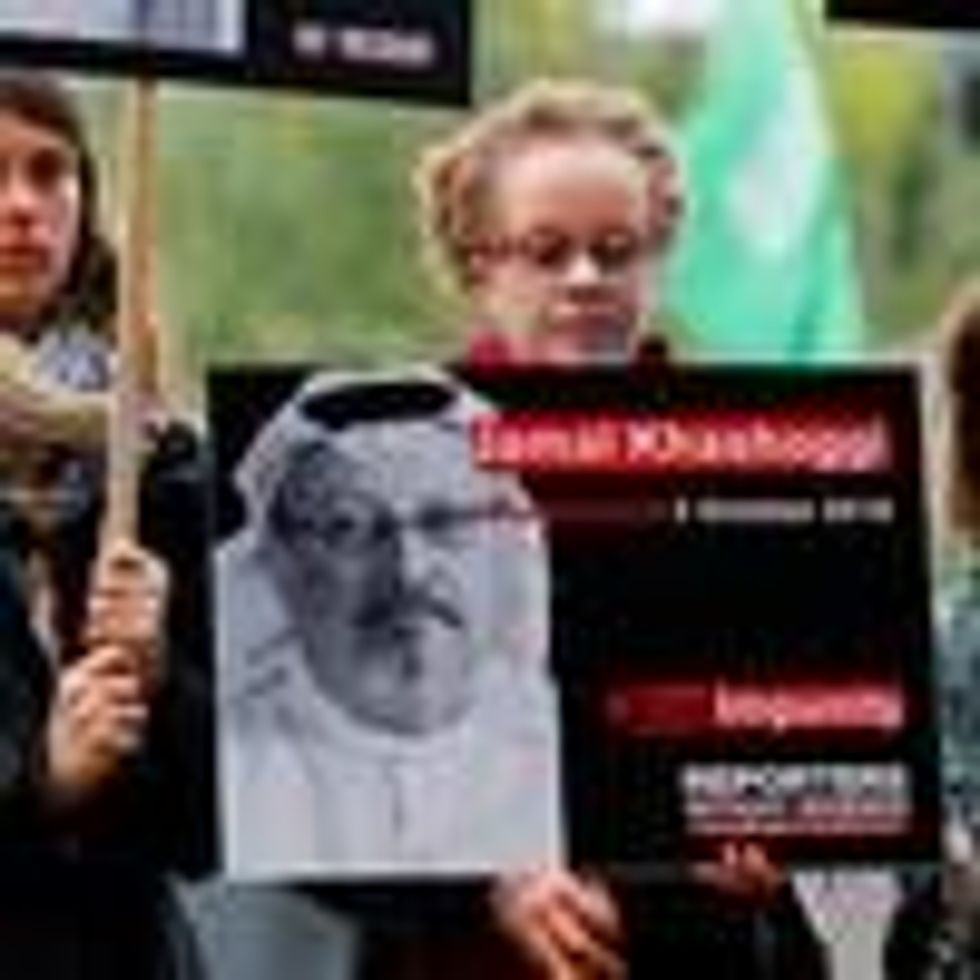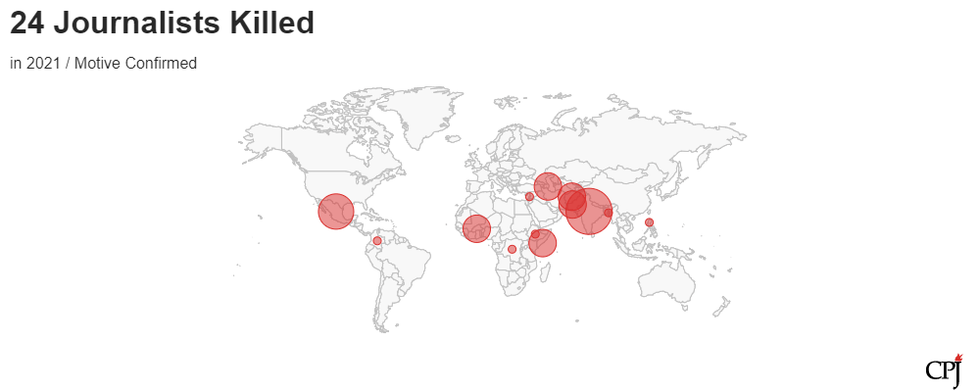

SUBSCRIBE TO OUR FREE NEWSLETTER
Daily news & progressive opinion—funded by the people, not the corporations—delivered straight to your inbox.
5
#000000
#FFFFFF
To donate by check, phone, or other method, see our More Ways to Give page.


Daily news & progressive opinion—funded by the people, not the corporations—delivered straight to your inbox.

Supporters of WikiLeaks founder Julian Assange protest outside London's Old Bailey court as his fight against extradition to the U.S. resumed on September 7, 2020. (Photo: Richard Baker/In Pictures/Getty Images)
Nearly 300 journalists are currently languishing behind bars around the globe--an all-time high in recorded history--according to a new report published Thursday by the Committee to Protect Journalists, which described 2021 as "an especially bleak year for defenders of press freedom."
The U.S.-based nonprofit's annual prison census found that 293 reporters were incarcerated worldwide as of December 1, up from the previous record-high of 280 last year.
"This is the sixth year in a row that CPJ has documented record numbers of journalists imprisoned around the world," CPJ executive director Joel Simon said in a statement.
"The number reflects two inextricable challenges--governments are determined to control and manage information, and they are increasingly brazen in their efforts to do so," said Simon, who added that "imprisoning journalists for reporting the news is the hallmark of an authoritarian regime."
According to CPJ, "China remains the world's worst jailer of journalists for the third year in a row, with 50 behind bars. Myanmar soared to the second slot after the media crackdown that followed its February 1 military coup. Egypt, Vietnam, and Belarus, respectively, rounded out the top five."

"No journalists were jailed in North America at the time of the census deadline," CPJ noted. "However, the U.S. Press Freedom Tracker, a partner of CPJ, recorded 56 arrests and detentions of journalists across the U.S. during 2021. Eighty-six percent occurred during protests."
While "the reasons for the relentless climb in the numbers of detained journalists... differ between countries," the group pointed out, "all reflect a stark trend: a growing intolerance of independent reporting."
"Emboldened autocrats are increasingly ignoring due process and flouting international norms to keep themselves in power," CPJ noted. "In a world preoccupied with Covid-19 and trying to prioritize issues like climate change, repressive governments are clearly aware that public outrage at human rights abuses is blunted and democratic governments have less appetite for political or economic retaliation."
Although some of the world's worst jailers of journalists, including Turkey and Saudi Arabia, released several reporters in 2021, CPJ argued that "it would be naive to see lower prisoner numbers as a sign of a change of heart toward the press."
The group elaborated:
As CPJ has noted, Turkey's crackdown after a failed coup attempt in 2016 effectively eradicated the country's mainstream media and prompted many journalists to leave the profession. Turkey's prison count is also declining as the government allows more journalists out on parole to await trial or appeal outcomes.
In Saudi Arabia, the intimidatory effect of Jamal Khashoggi's horrific murder and dismemberment in 2018, along with several new detentions in 2019, is likely to have silenced many journalists more effectively than any fresh wave of arrests. In addition, authoritarian leaders are increasingly finding more sophisticated ways to block independent reporters and outlets--notably internet shutdowns and increased surveillance through high-tech spyware--than keeping them behind bars.
Over the past three decades, hundreds of reporters have suffered fates even worse than being imprisoned for their work. Since CPJ began tracking such data in 1992, more than 1,420 journalists have been killed around the world.
Related Content

According to CPJ, at least 24 journalists have been murdered so far this year because of their coverage--19 who were killed in direct retribution for their reporting and five more who died while reporting from conflict zones or protests that turned deadly. Eighteen others "died in circumstances too murky to determine whether they were specific targets."

While the new report focuses on how "repressive regimes from Asia to Europe to Africa" invoked "new tech and security laws" to "crac[k] down harshly on the independent press," human rights advocates have highlighted how nominally democratic governments in the United States and the United Kingdom have facilitated attacks on whistleblowers and the media.
For instance, while the dramatic arrest of dissident journalist Roman Protasevich by the Belarusian government in May was condemned worldwide, critics not only called for the reporter's release but also drew attention to the eerie similarities between the actions of Belarus' authoritarian President Alexander Lukashenkoto and a 2013 attempt by the U.S. and other Western governments to capture NSA whistleblower Edward Snowden by diverting a civilian flight carrying then-Bolivian President Evo Morales.
Moreover, Yahoo News recently reported that in 2017, the CIA, under the leadership of then-Director Mike Pompeo, plotted to kidnap--and discussed plans to assassinate--WikiLeaks founder and publisher Julian Assange, who is currently imprisoned in London as he fights the Biden administration's efforts to extradite him to the U.S. Assange was not included in CPJ's tally of incarcerated journalists.
In July, when Secretary of State Antony Blinken said that the U.S. "will always support the indispensable work of independent journalists around the world," critics were quick to point out that Washington's purported commitment to press freedom doesn't apply to Assange, whom the U.S. government is attempting to prosecute for releasing classified information that exposed war crimes in Iraq, Afghanistan, and elsewhere.
Trump and Musk are on an unconstitutional rampage, aiming for virtually every corner of the federal government. These two right-wing billionaires are targeting nurses, scientists, teachers, daycare providers, judges, veterans, air traffic controllers, and nuclear safety inspectors. No one is safe. The food stamps program, Social Security, Medicare, and Medicaid are next. It’s an unprecedented disaster and a five-alarm fire, but there will be a reckoning. The people did not vote for this. The American people do not want this dystopian hellscape that hides behind claims of “efficiency.” Still, in reality, it is all a giveaway to corporate interests and the libertarian dreams of far-right oligarchs like Musk. Common Dreams is playing a vital role by reporting day and night on this orgy of corruption and greed, as well as what everyday people can do to organize and fight back. As a people-powered nonprofit news outlet, we cover issues the corporate media never will, but we can only continue with our readers’ support. |
Nearly 300 journalists are currently languishing behind bars around the globe--an all-time high in recorded history--according to a new report published Thursday by the Committee to Protect Journalists, which described 2021 as "an especially bleak year for defenders of press freedom."
The U.S.-based nonprofit's annual prison census found that 293 reporters were incarcerated worldwide as of December 1, up from the previous record-high of 280 last year.
"This is the sixth year in a row that CPJ has documented record numbers of journalists imprisoned around the world," CPJ executive director Joel Simon said in a statement.
"The number reflects two inextricable challenges--governments are determined to control and manage information, and they are increasingly brazen in their efforts to do so," said Simon, who added that "imprisoning journalists for reporting the news is the hallmark of an authoritarian regime."
According to CPJ, "China remains the world's worst jailer of journalists for the third year in a row, with 50 behind bars. Myanmar soared to the second slot after the media crackdown that followed its February 1 military coup. Egypt, Vietnam, and Belarus, respectively, rounded out the top five."

"No journalists were jailed in North America at the time of the census deadline," CPJ noted. "However, the U.S. Press Freedom Tracker, a partner of CPJ, recorded 56 arrests and detentions of journalists across the U.S. during 2021. Eighty-six percent occurred during protests."
While "the reasons for the relentless climb in the numbers of detained journalists... differ between countries," the group pointed out, "all reflect a stark trend: a growing intolerance of independent reporting."
"Emboldened autocrats are increasingly ignoring due process and flouting international norms to keep themselves in power," CPJ noted. "In a world preoccupied with Covid-19 and trying to prioritize issues like climate change, repressive governments are clearly aware that public outrage at human rights abuses is blunted and democratic governments have less appetite for political or economic retaliation."
Although some of the world's worst jailers of journalists, including Turkey and Saudi Arabia, released several reporters in 2021, CPJ argued that "it would be naive to see lower prisoner numbers as a sign of a change of heart toward the press."
The group elaborated:
As CPJ has noted, Turkey's crackdown after a failed coup attempt in 2016 effectively eradicated the country's mainstream media and prompted many journalists to leave the profession. Turkey's prison count is also declining as the government allows more journalists out on parole to await trial or appeal outcomes.
In Saudi Arabia, the intimidatory effect of Jamal Khashoggi's horrific murder and dismemberment in 2018, along with several new detentions in 2019, is likely to have silenced many journalists more effectively than any fresh wave of arrests. In addition, authoritarian leaders are increasingly finding more sophisticated ways to block independent reporters and outlets--notably internet shutdowns and increased surveillance through high-tech spyware--than keeping them behind bars.
Over the past three decades, hundreds of reporters have suffered fates even worse than being imprisoned for their work. Since CPJ began tracking such data in 1992, more than 1,420 journalists have been killed around the world.
Related Content

According to CPJ, at least 24 journalists have been murdered so far this year because of their coverage--19 who were killed in direct retribution for their reporting and five more who died while reporting from conflict zones or protests that turned deadly. Eighteen others "died in circumstances too murky to determine whether they were specific targets."

While the new report focuses on how "repressive regimes from Asia to Europe to Africa" invoked "new tech and security laws" to "crac[k] down harshly on the independent press," human rights advocates have highlighted how nominally democratic governments in the United States and the United Kingdom have facilitated attacks on whistleblowers and the media.
For instance, while the dramatic arrest of dissident journalist Roman Protasevich by the Belarusian government in May was condemned worldwide, critics not only called for the reporter's release but also drew attention to the eerie similarities between the actions of Belarus' authoritarian President Alexander Lukashenkoto and a 2013 attempt by the U.S. and other Western governments to capture NSA whistleblower Edward Snowden by diverting a civilian flight carrying then-Bolivian President Evo Morales.
Moreover, Yahoo News recently reported that in 2017, the CIA, under the leadership of then-Director Mike Pompeo, plotted to kidnap--and discussed plans to assassinate--WikiLeaks founder and publisher Julian Assange, who is currently imprisoned in London as he fights the Biden administration's efforts to extradite him to the U.S. Assange was not included in CPJ's tally of incarcerated journalists.
In July, when Secretary of State Antony Blinken said that the U.S. "will always support the indispensable work of independent journalists around the world," critics were quick to point out that Washington's purported commitment to press freedom doesn't apply to Assange, whom the U.S. government is attempting to prosecute for releasing classified information that exposed war crimes in Iraq, Afghanistan, and elsewhere.
Nearly 300 journalists are currently languishing behind bars around the globe--an all-time high in recorded history--according to a new report published Thursday by the Committee to Protect Journalists, which described 2021 as "an especially bleak year for defenders of press freedom."
The U.S.-based nonprofit's annual prison census found that 293 reporters were incarcerated worldwide as of December 1, up from the previous record-high of 280 last year.
"This is the sixth year in a row that CPJ has documented record numbers of journalists imprisoned around the world," CPJ executive director Joel Simon said in a statement.
"The number reflects two inextricable challenges--governments are determined to control and manage information, and they are increasingly brazen in their efforts to do so," said Simon, who added that "imprisoning journalists for reporting the news is the hallmark of an authoritarian regime."
According to CPJ, "China remains the world's worst jailer of journalists for the third year in a row, with 50 behind bars. Myanmar soared to the second slot after the media crackdown that followed its February 1 military coup. Egypt, Vietnam, and Belarus, respectively, rounded out the top five."

"No journalists were jailed in North America at the time of the census deadline," CPJ noted. "However, the U.S. Press Freedom Tracker, a partner of CPJ, recorded 56 arrests and detentions of journalists across the U.S. during 2021. Eighty-six percent occurred during protests."
While "the reasons for the relentless climb in the numbers of detained journalists... differ between countries," the group pointed out, "all reflect a stark trend: a growing intolerance of independent reporting."
"Emboldened autocrats are increasingly ignoring due process and flouting international norms to keep themselves in power," CPJ noted. "In a world preoccupied with Covid-19 and trying to prioritize issues like climate change, repressive governments are clearly aware that public outrage at human rights abuses is blunted and democratic governments have less appetite for political or economic retaliation."
Although some of the world's worst jailers of journalists, including Turkey and Saudi Arabia, released several reporters in 2021, CPJ argued that "it would be naive to see lower prisoner numbers as a sign of a change of heart toward the press."
The group elaborated:
As CPJ has noted, Turkey's crackdown after a failed coup attempt in 2016 effectively eradicated the country's mainstream media and prompted many journalists to leave the profession. Turkey's prison count is also declining as the government allows more journalists out on parole to await trial or appeal outcomes.
In Saudi Arabia, the intimidatory effect of Jamal Khashoggi's horrific murder and dismemberment in 2018, along with several new detentions in 2019, is likely to have silenced many journalists more effectively than any fresh wave of arrests. In addition, authoritarian leaders are increasingly finding more sophisticated ways to block independent reporters and outlets--notably internet shutdowns and increased surveillance through high-tech spyware--than keeping them behind bars.
Over the past three decades, hundreds of reporters have suffered fates even worse than being imprisoned for their work. Since CPJ began tracking such data in 1992, more than 1,420 journalists have been killed around the world.
Related Content

According to CPJ, at least 24 journalists have been murdered so far this year because of their coverage--19 who were killed in direct retribution for their reporting and five more who died while reporting from conflict zones or protests that turned deadly. Eighteen others "died in circumstances too murky to determine whether they were specific targets."

While the new report focuses on how "repressive regimes from Asia to Europe to Africa" invoked "new tech and security laws" to "crac[k] down harshly on the independent press," human rights advocates have highlighted how nominally democratic governments in the United States and the United Kingdom have facilitated attacks on whistleblowers and the media.
For instance, while the dramatic arrest of dissident journalist Roman Protasevich by the Belarusian government in May was condemned worldwide, critics not only called for the reporter's release but also drew attention to the eerie similarities between the actions of Belarus' authoritarian President Alexander Lukashenkoto and a 2013 attempt by the U.S. and other Western governments to capture NSA whistleblower Edward Snowden by diverting a civilian flight carrying then-Bolivian President Evo Morales.
Moreover, Yahoo News recently reported that in 2017, the CIA, under the leadership of then-Director Mike Pompeo, plotted to kidnap--and discussed plans to assassinate--WikiLeaks founder and publisher Julian Assange, who is currently imprisoned in London as he fights the Biden administration's efforts to extradite him to the U.S. Assange was not included in CPJ's tally of incarcerated journalists.
In July, when Secretary of State Antony Blinken said that the U.S. "will always support the indispensable work of independent journalists around the world," critics were quick to point out that Washington's purported commitment to press freedom doesn't apply to Assange, whom the U.S. government is attempting to prosecute for releasing classified information that exposed war crimes in Iraq, Afghanistan, and elsewhere.